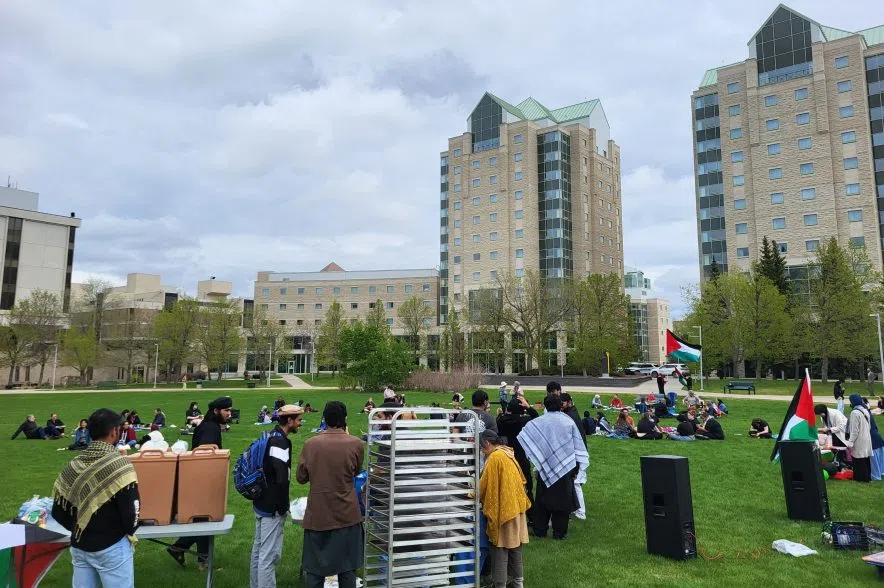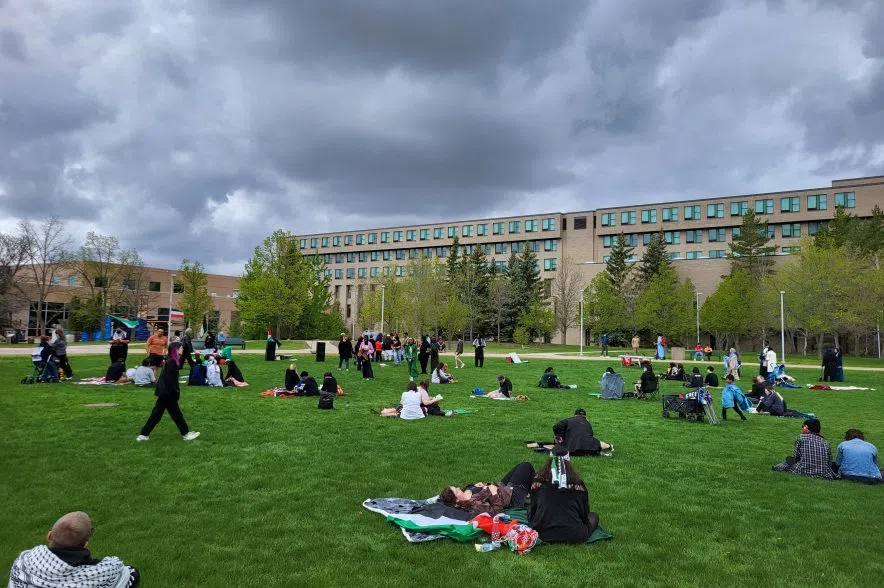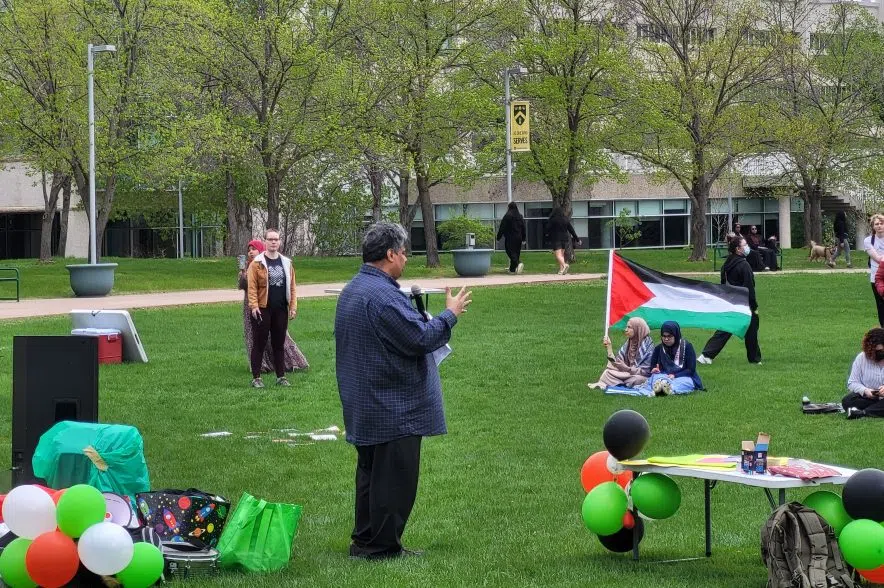Throughout Friday, scores of people gathered at the University of Regina for a peaceful Pro-Palestinian sit-in.
Students, faculty and members of the general public convened at the Dr. Lloyd Barber Academic Green for what was called a “Liberated Zone” – an area that would host teach-ins, art and prayer.
Batoul Abouelela said the event was organized in solidarity with Palestinians as well as in solidarity with many similar protests that have taken place at universities across North America.
“We need people to understand that this is a genocide,” Abouelela said.
“Just because we’re in Canada, that does not mean that we’re just far away from the issue or that it’s something for the Middle East (and) we shouldn’t be involved – no because even our government has been funding Israel.
“Our tax dollars are going to this so this is something that we should feel strongly about and talk about.”

Students and faculty called for an end to the war at the University of Regina. (Daniel Reech/980 CJME)
Since Oct. 7 Israel has killed at least 35,091 people according to the United Nations (UN).
In January, South Africa brought a case to the International Court of Justice alleging that Israel was committing genocide against Palestinians. While the court did not make a ruling on whether or not Israel’s actions constituted genocide, it did find that Palestinians had a plausible right to be protected from genocide and that South Africa had the right to present the claim to court.
Israeli Prime Minister Benjamin Netanyahu has denied that Israel is committing genocide.
The UN says more than one million Palestinians have been displaced since October.
“We’ve been cooperating with the university for them to disclose their investments and if they do have any investments that are with Israel, then we will definitely call for a divestment,” Abouelela said.
Former student Taylor Heaps said it was important for the Canadian government to know that many of its citizens stand behind the Palestinian people and that it is an issue that affects people worldwide.
“Injustice to somebody is injustice to everybody, that’s just something that I stand behind,” Heaps said.
The event hosted a wide variety of people including high schooler Yalda Akbari.
“We’re against the whole genocide so we came here to show (support),” Akbari said.
She was there with Dania Saleh, who said it was important to raise awareness about the conflict.
“When people see us like this, people are going to start researching and looking at (the issue) and then they’re going to be with us or against us, but it shows awareness of what’s going on in the world,” Saleh said.
“You should always stand up for what’s right,” added Alia Sherief.
“We can’t just watch this and not say anything. We have to make awareness and spread awareness by going to protests like this.”
READ MORE:
- Regina man loses contact with family in Gaza
- Regina woman from Gaza worries about family members
- Protesters block railroad tracks in east Regina in support of Palestine
Samira Azzahir who works with faculty, said she strongly supports the students.
“I want to be sure that in my heart, I am supporting the truth,” she said.
Azzahir said the war is part of a system of behaviours that are part of western thought.
“If it’s happening in Palestine, if it’s happening here, it’s the same system. So it’s about dismantling the system,” she said.

A “liberated zone” was set up on campus at the University of Regina. (Daniel Reech/980 CJME)(Daniel Reech/980 CJME)
Student Ali Elawad said Canada has a role to play in the conflict, especially since it was reported that Canada has authorized at least $28.5 million in new military export permits to Israel during the first two months of the war.
“(Canada’s role is) something that a lot of people fail to recognize,” Elawad said.
However, Elawad said Canada has the potential be a peacemaker as well.
“My concern is that a lot of people are neutral in the face of injustice when it benefits them but when it doesn’t, that’s when they’re outraged,” Elawad said.
“I think there’s a saying that goes ‘We’re not free until all of us are free.’ That goes for the entire world. The value of a life in Canada is equal to the value of life in Palestine.”
Valerie Zink has previously volunteered in Gaza and in the West Bank as a paramedic.
She accompanied ambulances to make it safer for them to travel through occupied territory as she said they were being targed by the Israel Defense Forces at the time.
“To call it a humanitarian crisis doesn’t even begin to capture the reality on the ground there,” Zink said in a phone interview.
“We have a situation in which doctors are being abducted and tortured to extract false confessions, some of them like the head of orthopedics at Al Shifa Hospital, a renowned surgeon who appears to have been tortured to death in the Israeli prison system. We’re having children undergoing amputations without anesthetic, women who are having caesarean sections without anesthetic. This is worse than any horror movie I’ve certainly seen.”
Zink drew parallels between the current displacement of Palestinians to what was witnessed in 1948 during the Nakba — a term describing the expulsion of more than 700,000 Palestinians from their homes when Israel was formed.
“This is a continuation of the same process of expulsion and displacement right that we saw beginning in 1948,” she said.
“Israel was established on the ruins of 400 Palestinian villages that were razed to the ground and the expulsion and colonization of Palestinian land has not stopped since then. It continues until today, and it will continue until the international community makes it stop.”












